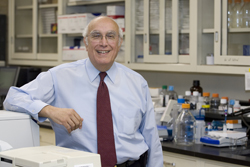|
University’s School of Pharmacy, where he will lead the new Center for Drug Discovery Research and join the faculty as professor of medicinal chemistry.
At Wyeth, Abou-Gharbia was senior vice president of Chemical & Screening Sciences, responsible for directing 500 scientists in the United States and 150 scientists in India focused on the discovery of innovative small molecule therapeutics in multiple disease areas such as neuroscience, inflammation, women’s health/bone, oncology and cardio-vascular/metabolic diseases.
During his 26 years at Wyeth, Abou-Gharbia’s research team contributed to the discovery of four major drugs now on the market and several more which are currently in clinical trials including:
- Effexor®, a first-in-class serotonin-norepinephrine reuptake inhibitor (SNRI) antidepressant
- Mylotarg®, an antibody-targeted anti-cancer agent
- Tygacil®, a broad-spectrum antibiotic
- Pristiq®, a second generation SNRI for treatment of depression
- Torisel®, a cell cycle inhibitor for treatment of renal cell carcinoma
Colleagues describe Abou-Gharbia accomplishments as nothing short of phenomenal.
“He led his team in identifying drug compounds with great potential; moving them through years of development and testing; and giving these compounds the quality and stamina necessary to survive through the challenging clinical trials and regulatory process,” explained Jerry Skotnicki, who worked under Abou-Gharbia for 25 years. “Doing this with one drug is amazing, but doing it with four is monumental.”
It was during his service on the School of Pharmacy’s Board of Visitors that Abou-Gharbia became aware of the school’s research commitment and growth and decided to make the move from industry to higher education.
“I was impressed with the school’s recent hiring of high caliber faculty and staff and saw many opportunities for cross fertilization with Temple’s College of Science and Technology and School of Medicine, as well as government, industry and other universities in the region,” he said.
Abou-Gharbia has always believed that ‘people make it happen’ and looks forward to mentoring and helping the next generation of scientists in drug discovery. Among his immediate plans at the Center for Drug Discovery Research will be the design and synthesis of small molecule therapeutics. He also plans to collaborate with researchers at the School of Medicine to bridge the gap between pre-clinical and clinical research by designing new tools, such as positron emission tomography (PET) ligands and biomarkers, in support of translational research.
“Dr. Abou-Gharbia is one of the most successful and respected leaders in medicinal chemistry worldwide. His outstanding scientific and leadership abilities will immeasurably strengthen the School of Pharmacy, especially in drug discovery, as well as the university’s translational research initiative. We look forward to his contributions as a research leader and as a mentor,” said Peter Doukas, dean of the School of Pharmacy.
Abou-Gharbia received his B.S. in pharmacy and pharmaceutical sciences and M.S. in medicinal chemistry from Cairo University. He then moved to the United States to earn his Ph.D. from the University of Pennsylvania and pursue a two-year National Institutes of Health Postdoctoral Fellowship at Temple’s School of Medicine, after which he joined Wyeth.
His scientific contributions include more than 180 invited lectures, presentations and publications, 99 U.S. patents and more than 350 patents worldwide. This year, the American Chemical Society honored him with the prestigious Alfred Burger Award in Medicinal Chemistry, and his team received the Heroes of Chemistry award for developing Torisel®, a first-in-class medicine for the treatment of advanced kidney cancer.
|
